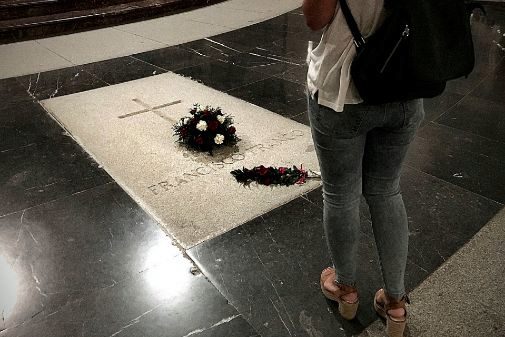In the absence of ten days for the Supreme Court to make a decision on the exhumation of Franco , the Valencian association ANCA (Associació Nous Comportaments Artístics) has already offered to turn such controversial remains into an artistic legacy free of unwavering adhesions or reluctant rejections. In a letter sent to the acting president of National Heritage, Alfredo Pérez de Armiñán, Manel Costa, on behalf of the group, requests the tombstone “with the intention of manipulating it and turning it into a work of art” , as stated in the written.
As soon as they receive the lapidary stone, the ANCA artists would "immediately" work on it, to turn "something abominable into something admirable and esteemed," Costa says in the letter. «If your most illustrious person has access to our request, please be assured that when the work is finished we will make a donation proposal to Manuel Borja-Villel, director of the Reina Sofía Museum in Madrid , and admired countryman, so that he is in charge to promote, in that extraordinary cultural container, the exhibition, for all the Spanish people, of the great work that, surely, will come out of the whole process ”, as highlighted in the document sent to National Heritage on June 29 .
The manager of said organization, Ernesto Abati, responded three weeks later, regretting that, for the moment, he could not proceed with the petition because Franco's exhumation procedure was suspended . However, it clarifies that if once this exhumation were resolved, the competent authorities would assess "the eventual fate of said gravestone, which in no case may be disposed of in accordance with applicable law."
In his expository plea, Manel Costa relies on Law 52/2007 of December 26, known as the Law of Historical Memory, in his article 15 related to the 'Symbols and public monuments', to support his request, since he considers proven, according to said law, the obligation of the Spanish Government to exhume the remains of Franco. «Given that, because of the news that in recent times coexist in the media, the« lineage »of the dictator is putting obstacles to the fulfillment of the desire of the Spanish people through their representatives in the Congress of Deputies», and giving for "almost certain" that the tombstone "has no interest" for their relatives, is why ANCA requests the stone for this time artistic purposes.
The request states that they are artists , "given their social and economic precariousness," who are accustomed to converting the futile "into something precious (the art povera, studied in universities)" take over the tombstone " in the name of art and justice ». With this, ANCA would transform such a tragic past into a work of art «for the joy of everyone and, above all, for lovers of experimental, complex, confusing and sometimes incomprehensible art, but with oddly admirable and endearing values and fragrances ».
The Valencian association ANCA thus returns to the public scene, 30 years after its foundation and subsequent disappearance, and after having left an extensive artistic legacy as a collective, working in fields as diverse as visual, sound, gestural and literary arts. In fact, precisely now he is preparing a retrospective exhibition at the Polytechnic University of Valencia , which will remain open from October 15 to November 10, with materials collected during the years of his most intense activity.
The ANCA book : An experience of collective creation 1990-2004 will collect in turn all the evolution of the association during the time of its peak in the cultural space, not only Valencian, but the rest of Spain.
The request made to National Heritage, with being one more action of its creative spirit now recovered, defines the transgressive poetic encouragement of a collective that combines, as Manel Costa collects in his writing, art and justice. His return to the panorama of avant-garde performing arts does nothing more than dust off his founding ideology, since ANCA began “in order to make possible the development of some modes of artistic expression scarcely contemplated and supported by public and private entities of our country, ”Bertomeu Ferrando, president of the association, wrote.
According to the criteria of The Trust Project
Know more- Supreme Court
- Spain
- Francisco Franco Bahamonde
NavarraThe Prosecutor's Office sees a possible hate crime in the 'Ospa Eguna' in Alsasua and asks the judge to ban it
JusticeThe European Union now admits that some countries do not respect the euroorder
OBITUARIOLa inaccessible and mysterious personal life of Camilo Sesto

